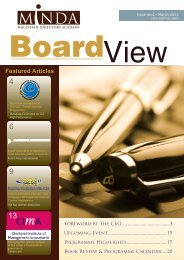FEATURED ARTICLES _ARTICLE TWOMALAYSIAN DIRECTORS ACADEMY 6One of the most significant challenges facing all organisationsis what McKinsey terms “The War for Talent.” The late 20thcentury saw a dramatic shift from the industrial to theinformation age in the western economies — a shift thatis now rapidly occurring in Asia and the rest of the world.Changing social values and demographics, technology,economics, political and physical forces drive thesestrategic shifts in the global economy. These five factorsshape business planning and specifically how executivesand directors must think about their people and the criticalrole they play in the firm’s strategy and value creation. Thetraditional model of the employee completing assignedtasks is of little value in a dynamic world where humancreativity and initiative are the driving success factors.In the 21st century, where technology is changing at anunprecedented rate, the primary impetus for Axiata’sprogress is, in the words of Tan Sri Ghazzali S A Khalid,independent director of Axiata, “a function of the level ofintellectual development and the training of high qualitybrains” — the basic requirements necessary to drive thetechnology in the telecom sector.It begins with Axiata’s team at the top. The CEO, Chairand board, are examples of Axiata’s innovative approachto talent development. The recruitment of the board ofdirectors itself represented the first exercise in selectingand developing talent to support the new strategy.CEO Jamaludin’s belief that talent development is a goal,just like profits, was a new way of thinking about humanresources — one he sees as critical if Axiata is to becomewhat he calls a “holistic regional champion”. The new CEOalso recognised that his growth strategy required that Axiataattract talented young and mid-level executives based oninteresting work, opportunities for personal developmentand a chance to make a meaningful contribution.“The Axiata board is committed to talent development asa core value. Most boards espouse talent developmentbecause it is professional, but our board lives thatcommitment. During the 2009 economic crisis we reducedour revenue projections and cut expenses across the boardexcept for talent development. The board’s commitmentremained steady to becoming a leading company based onstrong human capital.” CEO Jamaludin states.One of Axiata’s new remits in human capital developmentwas to build a talent pool so that 80 percent of the executiveand middle management positions are filled from withinthe company, with the remaining 20 percent external hires.Abstract of Case Study“Axiata: A Passion for Performance and People”Within the pool of existing employees, as a rule of thumb,70 percent would be nationals of the respective countriesin which the subsidiaries operate, 20 percent from withinthe Group and 10 percent with foreigners from outside theGroup.This succession plan based on developing internal talentmeans that Axiata needs to become what Jamadulin calls,“A Talent Factory.”The Axiata Talent Council was another important step atthe operating level to align all the firm’s companies aroundleadership development activities such as identifying,developing and filling key positions, and remuneration.The Talent Council was created to support this goalby developing a new partnership between the humanresources department and senior executives running thecompanies.The Axiata board regularly discusses and appraises howeffectively the talent development efforts are identifyingpotential candidates within and outside the Axiata group.This is especially true in the appointment of CEOs and CFOsat the various operating units, which involves a rigorousprocess from selection to appointment. Yet, despite thecomprehensive talent development planning for succession,Axiata has not as yet addressed the succession plan for itscurrent CEO Jamaludin. His contract has been extended foranother three years with an option to extend for anothertwo years.There is also another important dimension to Axiata’stalent development focus that is reflected in the firm’scorporate social responsibility (CSR) initiatives for theexternal community. Khazanah, through its Silver Book onCSR, encourages its GLCs to give back to society in order toimprove the social and economic conditions of the countriesin which it operates beyond developing locally relevantproducts and services. The Silver Book strongly encouragesthat CSR should be more than just economic support andthat the GLC should strive to find ways to align its CSR withits core strategies and business activities.Extending its talent development as an education platform,Axiata has invested in a social development programmewith a slight twist, “Our passion is to help develop futuremanagers and engineers who have leadership skills, cancommunicate through writing, speaking and challengingothers, think critically and have a positive attitude aboutthemselves and the world,” states CEO Jamaludin.This case study was written by Professor Randel S. Carlockof INSEAD for <strong>MINDA</strong>. This case is not for publication andis based on personal interviews and various media reports.
FEATURED ARTICLES _ARTICLE THREEIs Board of <strong>Directors</strong> Relevant?by Datuk Dr Syed Muhamad Syed Abdul KadirPreambleThis article attempts to show that the actions taken bythe regulators to ensure directors of companies are ableto perform their roles and responsibilities are acceptablestrategies. But it is argued these actions show “what”the directors must do. While indicating or prescribing andfocusing on “what must be done” by directors is necessarybut not sufficient to create effective boards. It is imperativethat directors should not only know what are theirresponsibilities but must also garner their energies to focuson “how” to ensure effectiveness prevails in the companies.It is argued that focusing on the “how” will make directors“relevant” to the companies. This article attempts toprovide some insights on the issue.IntroductionThe articles of association of a company specify that thebusiness of the company has to be managed by a groupof persons called “directors”. This is provided in detail inArticle 73 of Table A of the Companies Act 1965. In addition,the Companies Act 1965 also defines the term “directors”,duties and liabilities of directors and also restrictions ondirectors in performing their duties. 1 The provisions inthe mentioned act and the articles of association of thecompany have the objectives to indicate what directorscan do and what they cannot do which imply to determinethe scope of responsibilities of directors. Companies whichare listed on Bursa, the directors are subject to CapitalMarket and Services Act, Bursa Listing Requirements and<strong>Malaysian</strong> Code on Corporate Governance. In the case ofcompanies that fall under the ambit of licensed financialinstitutions, the directors are also subject to the Bank andFinancial Institutions Act 1989 and Bank Negara guidelines.In summary, all the above provisions attempt to determinethe responsibilities of directors, what are expected out ofthem and also defined the liabilities of directors. Again,emphasis on the “what”, and less on the “how”.Besides the above regulatory requirements, MinorityShareholder Watchdog Group (MSWG) established on thegovernment initiative in 2000 also monitors the corporategovernance activities of the listed companies. Theprogrammes and activities undertaken by MSWG, directly orindirectly, touch on the responsibilities of directors of listedcompanies. In addition, there are many training institutionsand providers that conduct training to ensure directors areconversant with their roles and responsibilities. Some ofthe programmes are made mandatory and there are thosethat are treated as optional or voluntary. Examples of suchinstitutions are <strong>MINDA</strong>, FIDE and ICLIF. These actions can beconsidered as proactive initiatives so as to ensure directorsare able to perform their roles and responsibilities.Based on the above, it is seen clearly that the regulators areconcerned for directors to know their responsibilities andto operationalize their concerns is by establishing traininginstitutions and/or organising training programmes. Theseactions are certainly welcome by the shareholders.While the above actions are very logical steps to elevatethe capability of directors and also to enhance corporategovernance, it is equally importance to know and identifythe underpinnings of the roles and responsibilities of Boardof <strong>Directors</strong>.7BOARD VIEW_SEPTEMBER <strong>2011</strong>1Sections 131 and 132 of the Companies Act 1965 provide detailed provisions.







